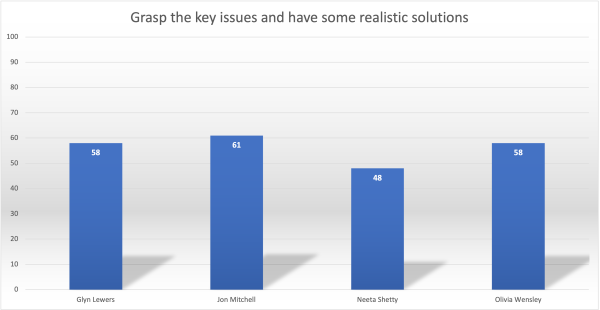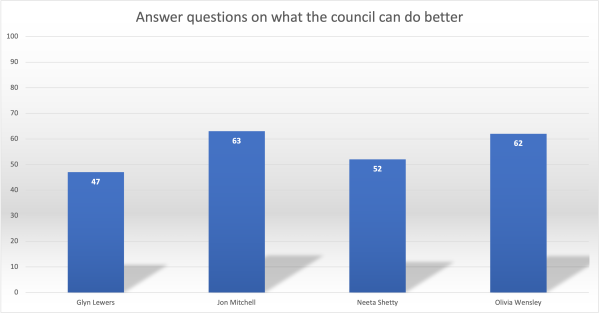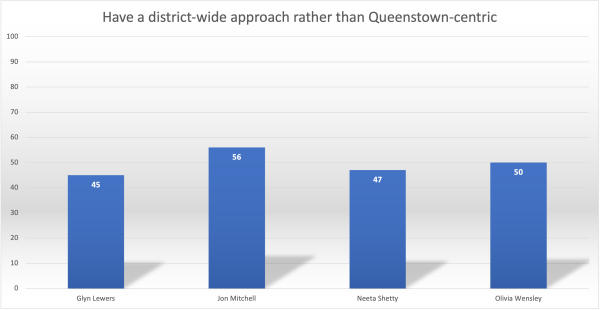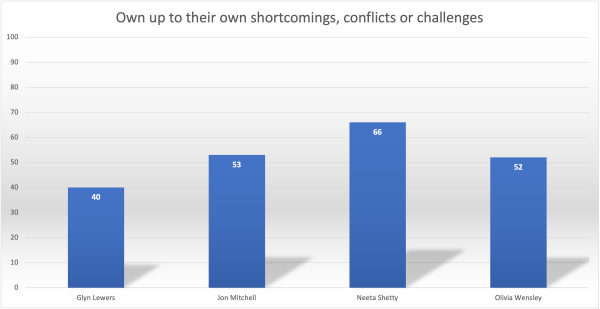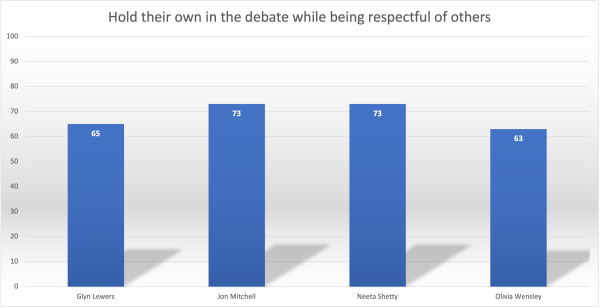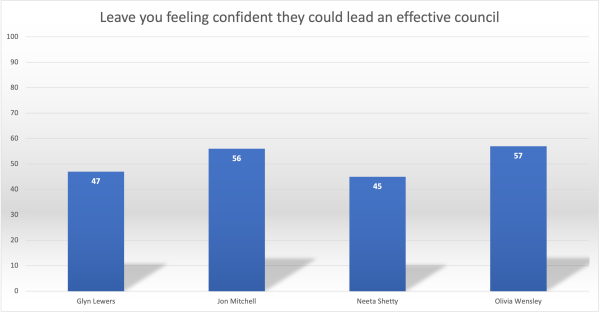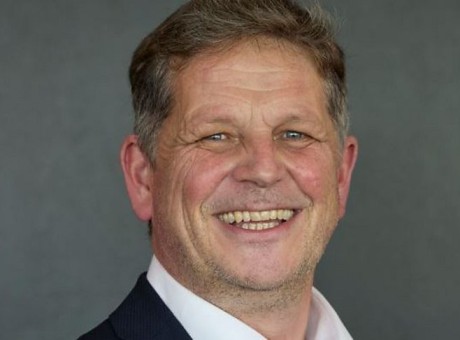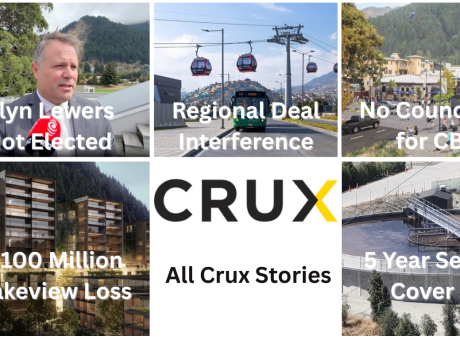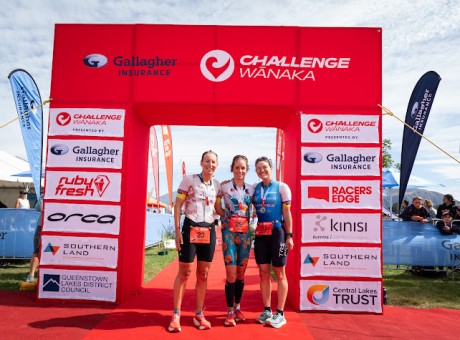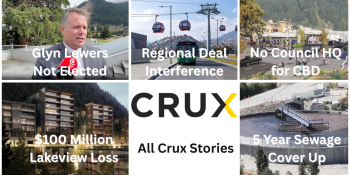Community verdict: Which QLDC mayoral candidate came out on top?
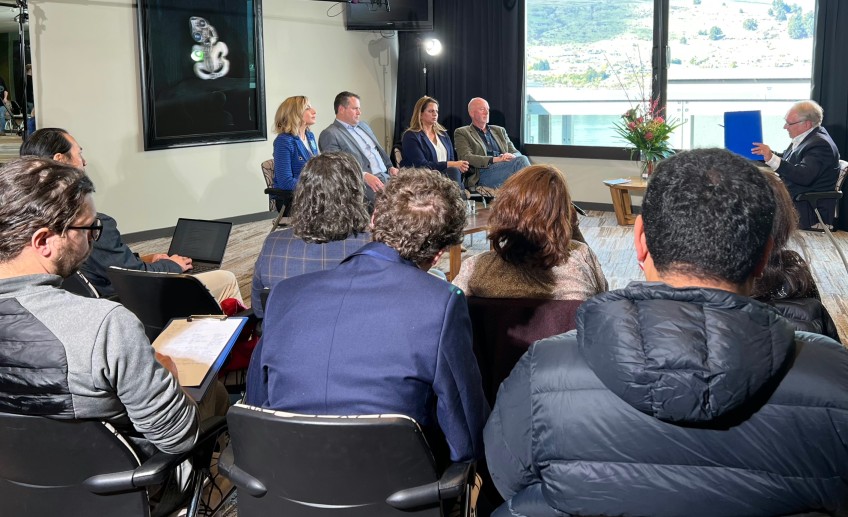
Crux pulled together a community panel to watch our top polling mayoral candidates debate live. We asked them to sit back, listen and watch as four of the Queenstown Lakes District's would-be mayors responded to questions posed by Crux managing editor Peter Newport and how they responded to each other. Here's their takes on who came out on top, and why you should watch the debate for yourself.
Amanda Robinson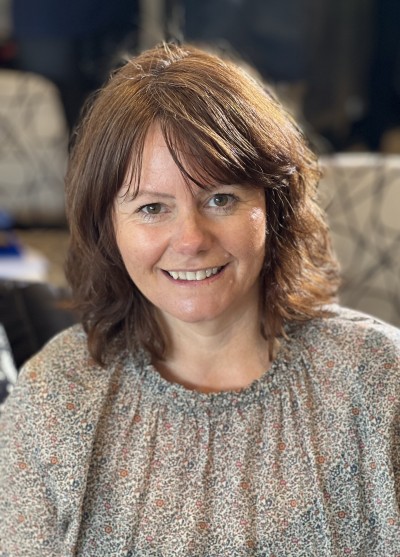
I work in a national subject leadership role for the New Zealand Qualifications Authority. I'm the co-founder and a trustee for the Lightfoot Initiative Charitable Trust. I'm the Whakatipu community representative on QLDC's climate reference group and a trustee on the QPS board.
Which of the candidates did you like the most by the end of the debate and what was it that won you over?
I like Neeta the most, but I believe Jon offered the clearest explanations for how he would resolve some of the deep-seated issues in endemic in the current council. Jon offered several solutions that demonstrate an excellent grasp of the realities of local and national constraints. His focus on changing culture was realistic and he had a clear path of how to achieve this.
But who's best for the job, do you think?
Glyn and Jon have the best understanding of how local government and governance work. Neeta's focus on community representation also positions her well. I agree with a lot of Olivia's enthusiastic ideas, which are likely to be unachievable considering this constraints of the public sector. I think Jon will best represent the community and successfully address many of the issues raised by Peter today. Jon won't need external support to create change as he's experienced at leading, he is less likely to be susceptible to external influence as well. I believe Neeta and Glyn would be great as councillors, and it is a shame that Glyn is not standing again as a councillor. Many of the ideas proposed by each candidate has merit and I'd like to see Olivia's voice and enthusiasm captured if she's unsuccessful. Overall, however, Jon provided the most consistent and informed responses.
What's one of your top concerns for the district and how did the candidates address it?
Each of the issues Peter raised are linked to a core issue of growth. Growth encompasses transport, development, water, and disaster management, along with tourism and resilience. Financial management is a key issue. Neeta and Glyn offered limited vision about how they would lead this. Jon offered multiple solutions for each of these issues. Olivia has strong positions on stopping or changing the issues but was unclear on how she'd achieved this as mayor.
Something that really stood out for me in the debate was...
The discussion about Queenstown Airport Corporation. Glyn's position on this has historically not been strong enough. Olivia's position of wanting more control was good. Jon's point about the possibility of the community losing their majority shareholder because of the leaking building claims and future debt of the QLDC was new info for me, and therefore very surprising.
I applaud all of them for considering taking on this level of challenge.
Phil Lemalu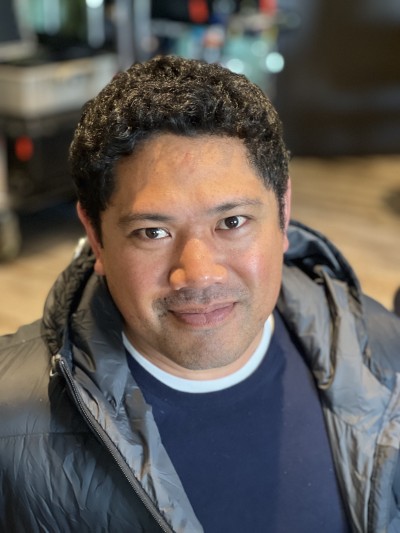
Remote professional – Digital marketing manager (contractor)
Which of the candidates did you like the most by the end of the debate and what was it that won you over?
Olivia, Neeta and Jon. All three candidates bring a persepctive for change in the council and mayoralty. They had shared concerns about key issues in the community including a lack of transparency of projects including Lakeview and the airport.
But who's best for the job, do you think?
Jon Mitchell – while Olivia and Neeta are great candidates, Jon still has the relevant experience to understand the complexities of working with stakeholders in the public sector. I’m worried the low trust model that Olivia wants to work from may alienate a lot of the current staff across the council or relevant stakeholders.
What's one of your top concerns for the district and how did the candidates address it?
The Lakeview development – Jon, Neeta and Olivia were well informed about the development history and current timeline especially Jon and Olivia. They broke down what has gone wrong at different steps.
Something that really stood out for me in the debate was...
How defensive Glyn was with all respects to questions asked by the facilitator or when he would respond to other candidates for clarification on facts. He didn’t really focus on how he would approach things if he were mayor or even ways he would improve on anything. He seemed very content with how things were.
Something that happened in the debate that I reckon people should go and watch for themselves was...
Watch Jon, Neeta and Olivia address Lakeview and how it has been a missed opportunity for the community.
One thing from the debate that made me think “people need to vote this year” was...
Jon Mitchell. He is experienced and diplomatic in his responses and most importantly, how he would use his experience to bring a very fractured council together and working for the communities in the district.
Dr Jane Shearer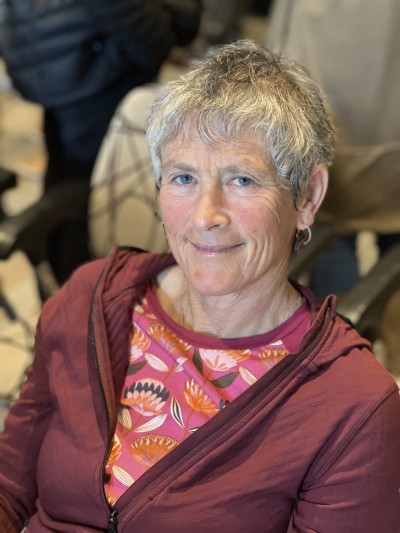
I own my own business – resolutionz consulting – which helps people access funding in order to carry out research, development and innovation. I have lived in Gibbston since 2013 and visited relatives in the district for decades.
Which of the candidates did you like the most by the end of the debate and what was it that won you over?
Who did I like...does that matter? I want them to do a job, not be my friend. I possibly liked Neeta the best as appearing the least ‘positioned’ of the candidates but that doesn’t make her best for the job.
But who's best for the job, do you think?
Olivia Wensley – she has the energy and commitment to be the mayor. Afterwards I asked her what her skills are for leading a disparate bunch of councillors and she said she believes her strengths are in pulling teams together and mediation. In law she undertook a lot of mediation and believes you can get people to see their commonalities as much as their differences.
What's one of your top concerns for the district and how did the candidates address it?
My top concern is overtourism/over-reliance on tourism as an income source and all the flow-on effects of tourism as the core focus of the district. My underlying concern is that I believe a place should primarily be about and for the people who live in the place rather than the people who come to visit. Therefore tourism should only take place insofar as and in the way that the community want it.
All candidates referred to this issue. No one had any particularly concrete ways of solving it. Not very surprising – it is a wicked problem. At least it’s a start that people are saying we don’t want too many tourists.
Something that really stood out for me in the debate was...
What I felt wasn’t really covered was the background of the people that makes them the right person to lead the council team and how they can manage the leadership role in the context of their own ideas/principles. I believe that leadership is the critical part of the mayor role.
Eoin McGlynn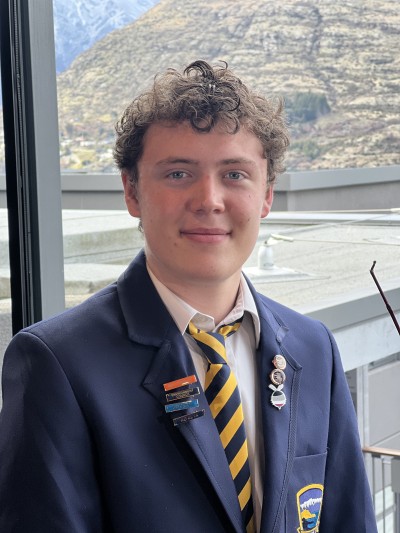
I am currently a year 12 student enrolled in Wakatipu High School, and I am on this panel representing both my school and the youth of the Queenstown Lakes District. My passions include reading, writing, hiking, and I have an acute interest in learning about and becoming involved in politics. After high school, I plan to study Law, Political Science, and International Relations at Victoria University in Wellington, and from there pursue a career in environmental policy.
Which of the candidates did you like the most by the end of the debate and what was it that won you over?
All four candidates present at this debate had different aspects of their personalities and arguments that were appealing to me as an observer. However, there is one candidate who I left the debate liking most as a potential future mayor, and that was Jon Mitchell. The immediately clear reason for this was the ease with which he held himself and spoke. When he was answering questions and speaking with the other candidates, his tone was conversational and relaxed. He treated the debate almost like a fireside chat with friends, an attitude that was in contrast to the other candidates. It never felt at any point like he was lecturing the audience, or giving a speech. Despite his casual tone, it was clear how much Jon cared about both the individual debate and his overall mayoral campaign, a fact that was made immediately apparent by his opening remarks. He quickly summarized his past experience in Disaster Management, Civil Defense, and Education, along with his personal links to the local district and its government. However, it was the next part of his opening speech that really set him apart from the other candidates. Each problem he identified, he followed with a concrete and specific solution, along with how and when he planned to implement them.
But who's best for the job, do you think?
This question is a difficult one to answer, as each of the candidates have appealing aspects of their platform, opinions, and plans. Olivia Wensley brings a dynamic and modern approach to economic diversification and other issues, but I personally feel she is a bit too focused on economic development to be the best candidate at this time. Glyn Lewers has the most experience in governing of all the candidates, and his prior consideration of the environmental and climate change related issues that I care about was tempting. However, the direction of QLDC arguably needs to change, and he perhaps represents the status quo a bit too much, as many voters have been concerned about. Neeta Shetty was in touch with the community and the passion she felt for furthering it was noticeable, but when questioned on specific issues she had a much more limited knowledge than that of the other candidates. This leaves Jon Mitchell, whose aforementioned concrete plans and high priority of the environmental issues faced by the district, along with his prior experience in managing the sorts of disasters that will only become more common with advancing climate change make me feel that he is the best candidate for the job.
What's one of your top concerns for the district and how did the candidates address it?
As was likely noticeable from my previous answers, the primary issue I am concerned about, not just for the district but also for wider New Zealand and the world, is that of climate change and other environmental issues. However, there was very little satisfying discussion of these issues at this debate, beyond the mentions of the controversy surrounding the Tarras Airport. Though even that was primarily focused on the impact to the people of Wanaka rather than the environment. While it is unfortunate that this arguably very prescient issue wasn’t discussed at this debate, many other important issues related to the powers of and trust in the council were. However, this debate was simply one of many, and these issues are discussed in more detail at other events.
One thing from the debate that made me think “people need to vote this year” was...
It is highly important that people need to vote this year, as whichever mayoral candidate wins will have a not insignificant impact on the direction of the district and its government over the coming years. The main reason for this is that the years of Coivd-19 being a big issue for international and domestic tourism seem to be coming to an end, and with the borders reopened, the next mayor will have to make the decisions on how to manage the renewing levels of tourism that just aren’t sustainable. This will need to be solved, and the range of opinions on this highly important issue across the candidates shows that the outcome of the election will impact the plan moving forward. Additionally, other issues such as the Tarras Airport, Three Waters, and Co-Governance are incoming, and while the candidates had largely similar opinions on these, there are still differences in opinion that will impact how QLDC handles these and other issues. And even if one doesn’t have any particular concern for these issues, this election marks a partially new beginning for local government, with Jim Boult gone and a council with fewer than half its members slated to be incumbents, the next mayor will have a hand in steering the district.
Trent Yeo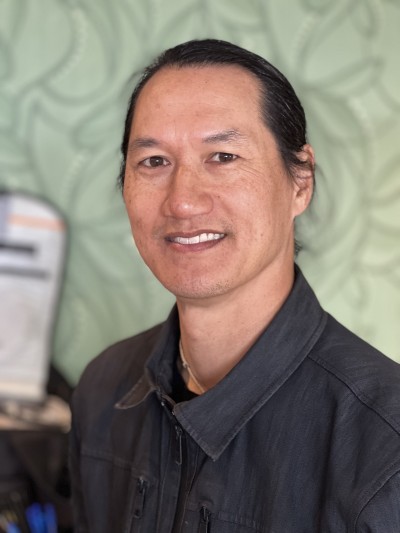
Executive director of Ziptrek Ecotours, on the Tourism Industry Aotearoa Board, working on the Tourism Industry Transformation Plan (workplace and environment) and Visitor Economy Climate Change Adaption. Formerly worked on Startup Queenstown Lakes, Shaping Our Future, and TEDxQueenstown, among other roles.
Which of the candidates did you like the most by the end of the debate and what was it that won you over?
All candidates offer a different perspective or value to the role of mayor. Great to see the personal drive to be in this role. I don’t think anything new changed my personal ‘likes’. I have been to a couple of live sessions already and been generally looking at media coverage.
What I would like to discover is whom might be the fastest learner on the job. Not just knowledge of subject matter but capacity to adapt to the culture, scope of the role, and the rules of engagement (what can you really do as a regional mayor). I am not clear on that.
But who's best for the job, do you think?
Two horse race: Glenn and John. I would love an aspirational, competent and well spoken leader. I also am looking for a person who understands the limitations of this role but with a healthy level of impatience about seeking change within council. Ultimately Glenn and Jon seem to have a good perspective on their own values whilst understanding that they represent the community not simply their own views. I still think the race is open.
What's one of your top concerns for the district and how did the candidates address it?
Where have we been? Where are we now? Where are we going? What does the next stage of Queenstown look like? What capacity do I have to facilitate change in this role as mayor? Olivia best paints a medium term future. I recognise that that might be tempered by a realism of the role of mayor.
Something that really stood out for me in the debate was...
Jon on Lakeview: "I work in disaster management and this is a disaster".
Glynn about council processes: "Perfect is the enemy of good".
I think people should understand who these people are, find out what capacity they have to influence and bring people together (their council) on important matters. I am also interested in how you represent the community and a broader representation of the diversity of Queenstown Lakes, not just yourself. I am not still clear on that.
Jillaine Fleming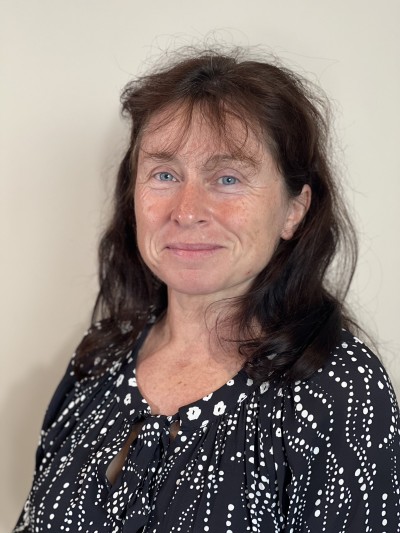
You will find me to be middle-aged and always thought it was best to leave the politics to the politicans....but I’ve awakened! As a volunteer in the ‘older adult’ community I see that the council - in it’s entirety – is a force that drives the direction of our community. The elections are the beginning of our opportunity to effect that force.
Which of the candidates did you like the most by the end of the debate and what was it that won you over?
Glyn, Jon and Olivia I felt were able to give detailed responses, and often referenced relevant experience. On occasion though, whether you were listening to fact or fiction was a bit hazy, but there was certainly a lot of confidence in their responses! Neeta spoke well and she left me feeling she would be quite environmental and community focused, my opinion of her moved more favourably than any of the other candidates.
But who's best for the job, do you think?
I’ll wait till the day to cast my vote! But if you are like me and in the past haven’t given much thought to the local elections but somewhere deep down you know you should, then please take a lunch-break and watch the mayoral debate. It will give you a flavour for the candidates and you might just surprise yourself and want to know more.
What's one of your top concerns for the district and how did the candidates address it?
Personally I’m interested in seeing the council and our community develop more age-friendly policies and practices. This was not a specific topic during the debate, so in my view none of the mayoral candidates addressed these issues.
Something that really stood out for me in the debate was...
The Airport Question! I felt some candidates revealed more of themselves during this question time. Putting aside the usual political responses there was a bit of jeering, fact correcting and difference of opinions.
One thing from the debate that made me think “people need to vote this year” was...
Please vote. But don’t just tick a box. Identify with a candidate that you find yourself nodding your head too – watch the debate, read articles, google them and make an informed decision.
Lincoln Haworth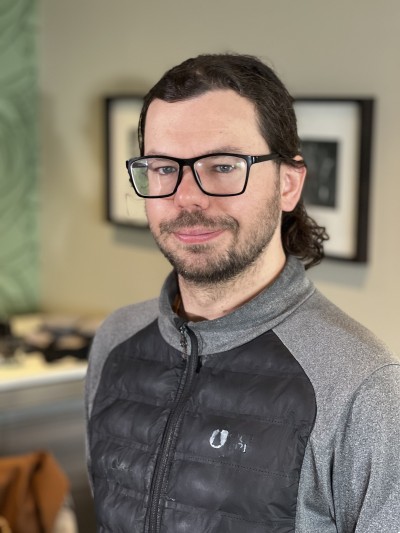
2019 Wānaka Ward candidate.
Which of the candidates did you like the most by the end of the debate and what was it that won you over?
Mitchell for talking straight about the airport expansion plans and their relationship with tourism, Lewers a close second but loses for a doubtful claim on the airport issue.
Shetty was well-liked by her fellow candidates. To gain the support of your peers is a very strong endorsement for a candidate in my view, suggesting the candidate has technical competency and ideological balance. However that didn’t seem to be born out in Shetty’s responses, she seldom touched on key issues or displayed familiarity with the detail of key issues.
Lewers seemed to suggest that he believed development of Wānaka Airport would not go beyond the publicly released strategy (i.e. narrow-body jets only). In my view I think that is likely either naive or dishonest and I think voters can safely assume the long-term objective of the current executive is for Wānaka Airport to operate wide-body international flights off a 2000m+ runway and all the associated infrastructure. I am extremely wary of any pro-jets politician who says different. Wānaka voters have become allergic to spin on the issue. Lewers also seemed to be an advocate for his voters as a councillor – a mayor would have a broader responsibilty. He didn’t articulate any intent to be a mayor for everybody.
Wensley sounded like a year twelve NCEA student who had been told the key to passing her public speaking assessment was “giving examples”. The examples given were mainly people she had been “talking to” – “mulitiple ministers” and “iwi”. It sounded like a networking checklist not an attempt to sincerely do anything for the district. When asked how difficult it would be to “change things” her response was little more than “I can change things”. She did touch on the importance of lobbying and influencing central government – a role that is often poorly addressed in local body politics. Overall though, it felt stilted and far from genuine.
Mitchell was clearly keen to solve issues with costly and drawn-out reviews and inquiries, though perhaps we can see that as a polite declaration of war against the current executive. The voters can make up their own minds if the case has been sufficiently established against the current executive in the courts and the media. He repeatedly criticised “culture” at QLDC and promised reform, which is... a rather broad policy to have.
Some fascinating contradictions emerged in our candidates and I can’t help but highlight them because I found them quite jarring, and problematic:
- Lewers was the only candidate to mention climate change, yet he is a steadfast supporter of airport development. These are irreconciliable positions.
- Mitchell talked about constraining growth (he can’t – a ridiculous goal to set) and yet also declared he would make resource consents easier to obtain, which could only be interpreted as pro-growth. Position: unclear.
- Wensley distanced herself from her father-in-law’s hundred-million-dollar claim over the Oaks Shores resort, but then went on to defend him as well...It’s unclear what her view is on the ethics of ratepayers footing this bill. It’s quite clear where a representative of ratepayers should sit on the issue.
But who's best for the job, do you think?
None of them.
How did council wind up the loser in the Lakeview agreement? There lies the root of that issue. None raised it or offered a solution. Perhaps Mitchell’s rather broad goal of cultural reform of council came closest.
Why should the current executive stay in the job, given the concerns about transparency and representing residents’ views? There lies the root of that issue.
Will we price-in the considerable externalities of any airport development, particularly climate change? There lies the root of that issue (To paraphrase Douglas Adams: “and this made a lot of people very angry.”) None of the candiates wanted to take that issue head-on.
You’ve got to feel a bit concerned about how these candidates would fare against the likes of Peter Thiel, and other quiet titans in the district. It looks as though whoever wins, our Mayor will be comprehensively outgunned and outmanouevered by private interests, and that is a legitimate concern for residents who deserve a council who works for them. I can’t feel confident in any of these candidates against influence that muscular.
What's one of your top concerns for the district and how did the candidates address it?
Development/housing/cost of living - I really would have liked to see some further discussion on the housing point. The three concepts I would like to see addressed by the candidates are: supply, demand, and environment. Captured in those three words is about 40 percent of politics in the QLDC, though that’s not to say any are simple to address. If you wanted to extend it a bit, you could add “competition”, as there are hints of anti-competitiveness poisoning that market in the QLDC as well.
None of the candidates came near these key concepts. Mitchell offhand promised to simplify resource consents, but had no opportunity to demonstrate an understanding of the complexity of that battleground.
Wanaka - We have a four-way tie between our mayoral candidates for the prize of “most inane take on the Wanaka issue”, and the competition is seriously fierce. Levels of inanity hitherto unprecedented have been achieved across the field, new records have been set, and a couple of minutes of the audience’s lives have been terminated with extreme prejudice.
Our first competitor for this prestigious trophy is Glyn Lewers, who grandly informed us that Wanaka residents are very “staunch and clear” in their views. He did not elaborate as to what, in his interpretation, those “staunch and clear views” are. Interpreting what residents’ views are will be Lewers’ job should he become Mayor. He avoided doing that job, with precision-guided tactical vagueness, and I don’t even think he was trying to be a politician about it, he just didn’t really have anything to say.
Wensley offered an earth-shattering policy: change the name of the QLDC to “Alpine Lakes District Council”. Pointless tokenism. There were some other platitudes but they were utterly immemorable.
Screaming in with a play from the left came a spectacular piece of inanity from Jon Mitchell, who has “skied a lot in Wanaka” and is a “fan” of Wanaka. Apparently we are “more in touch with the land”, which I struggle to rotate into any sort of compliment. It vaguely makes us out to be distant wild barbarians who stage the occasional incursion. I think Mitchell was loosely aware of the gist of environmental politicking in Wanaka, but no specifics emerged.
Shetty made a valiant challenge for the prize with the truly critical observation that QLDC office in Wanaka has not moved since circa 2009. I’m sure this issue is at the forefront of every Wanaka resident’s mind ever since it has dominated headlines in the Wanaka community. May I suggest to Shetty that we move the QLDC offices to an 11-storey brutalist concrete block, preferably on the Wanaka lakefront? To ensure everyone knows that this controversial issue has been solved comprehensively.
A disappointing showing from all candidates on the matter of Wanaka.
Glenorchy, Arrowtown, Luggate, Hawea – not even a mention.
Something that really stood out for me in the debate was...
Mitchell and Lewers, from quite predictable opposing sides of the spectrum, actually frequently agreed with each other, indicating a level of “mainstream consensus” that highlights them as the only credible candidates. Both demonstrated detailed knowledge, particularly of the legal issues at play in the $162.9 million leaky building claim against council over the Oaks Shores Resort. Both displayed appropriate frustration over the issue, as the ethics of ratepayers footing the bill are very dubious. They also both demonstrated specific knowledge of the Lakeview development issue.
However a fleeting acronym mentioned by Lewers also stood out to me: BHP. The mining company. QLDC voters should know a mayoral candidate comes from a mining background, given the previous mayor, from an airport management background, displayed a penchant for building airports.
Rachel Rose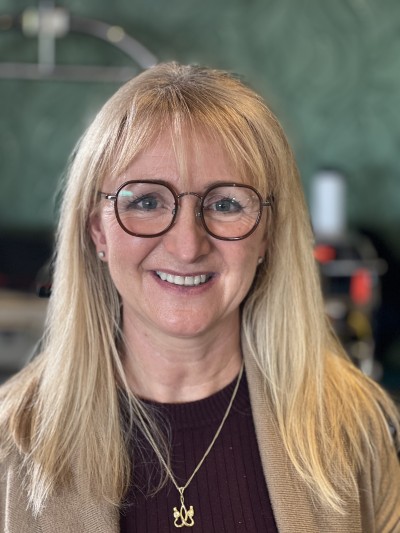
Southern Discoveries HR manager (part-time), Central Lakes Family Services HR manager (part-time), and Shaping our Future board member.
Which of the candidates did you like the most by the end of the debate and what was it that won you over?
Jon Mitchell - we need someone who is progressive and understands how local government can work well. I also sit on the board with Jon at Shaping our Future and see his quiet passion for our area and his depth of knowledge of policy and process. I believe he will be able to tackle the complexities that the QLDC mayoralty will present. John was respectful of the other candidates and also has a sense of humor.
But who's best for the job, do you think?
See above
What's one of your top concerns for the district and how did the candidates address it?
A lack of affordable accommodation to ensure a diverse and thriving community where people can afford to live and work.
Something that really stood out for me in the debate was...
Neeta's complete lack of understanding that we are a bicultural nation with obligations under the Treaty of Waitangi. The other candidates had a better grasp.
Brett Giddens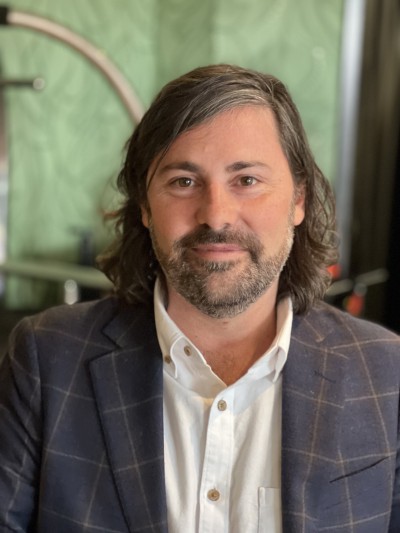
Owner of Town Planning Group, town planner with significant development and local/central government experience, long time Queenstown local of 20 years.
Which of the candidates did you like the most by the end of the debate and what was it that won you over?
All the candidates did well and are representing different aspects of the community. The district is fortunate to have passionate and high quality candidates.
There is a little naivety with what the candidates expect to be able to achieve versus what they can actually achieve in a governance role like this. For example, Jon stated that within the first 30 days he will initiate reviews of the District Plan, the Spatial Plan and the Long Term Plan. All of these plans have legislative foundations and have gone through formulation/review processes; it is not realistic to expect that they can be reviewed or that he would get the votes around the table to even revisit them in any form. Even if they could, the combined cost would be in the tens of millions. My concern is that a lot of what is being asserted will happen won’t actually eventuate without government intervention, which seemed to be best recognised by Olivia through her intent to lobby Central Government to enact change. It is clear from Glyn’s time on the council that he understood the limitations of the role the best out of the candidates.
Of the candidates, Olivia impressed me the most. The role needs a big picture thinker and someone who is prepared to lobby hard at government level for the district. Her legal background and fact she is already embedded Central Government politics in her role as CEO of Start Up Queenstown in gives her a strong advantage.
Glyn was a close second for me followed by Neeta, who clearly has a strong interest in maintaining community values. Jon raised some good points throughout but my concern is that many critical aspects he is promoting will not be able to happen in reality.
But who's best for the job, do you think?
See above.
What's one of your top concerns for the district and how did the candidates address it?
Addressing the shortage in housing is a critical issue to me and the timing to make a measurable difference does not appear to have been grasped by most of the candidates. Olivia was the only candidate who has put forward a solution for affordable housing that could be seen as having an impact within a three year mayoral term, being the build to rent model that will have a direct benefit on worker accommodation.
All candidates want to see residential houses used for full visitor accommodation reduced to free up accommodation stock in the district, particularly in Central Queenstown. No one confirmed how they would actually achieve this and Jon’s call for a review is too little, too late as the District Plan provisions have only recently been made operative by the Court.
Glyn acknowledged that the council’s inclusionary zoning plan change that seeks to introduce a new tax to fund affordable housing “will go to the High Court”. I think he is 100 percent right and that it will be tied up in litigation for a number of years, significantly more than a three-year mayoral term.
Jon and Glyn are supporters of the new policy. Neeta hasn’t made a position clear. Olivia is opposed to it because of the unintended effects of taxing new builds in subdivisions and the tax being unnecessary compared to build-to-rent options, and increasing unaffordability for sections that are not in the housing trust pool.
Olivia impressed me in that she has clearly done her homework on the new tax and its implications, and thought about real world solutions that could be adopted that will have an impact.
Something that really stood out for me in the debate was...
Jon seemed to indicate that he would build a new council office building in Wānaka. While I am sure the public servants who occupy it would appreciate a large multi million dollar building, I am sure the Wānaka locals would prefer that money be put into other things that benefit them more directly and I am not convinced that a new council building is the best way to spend ratepayer money.
Something that happened in the debate that I reckon people should go and watch for themselves was...
When the candidates were fronted with questions about concerns raised on each of them on social media, Olivia’s family link to Wensley Developments was mentioned and her answer is worth a watch.
One thing from the debate that made me think “people need to vote this year” was...
One thing that is clearly coming is change. Each of the candidates have different views on what change they think the district needs – some views were prudent and logical, some a little scary and concerning.
Report cards - as scored by our panel members. One was a low score; 100, top marks. We asked our panel members how well a candidate was able to...
